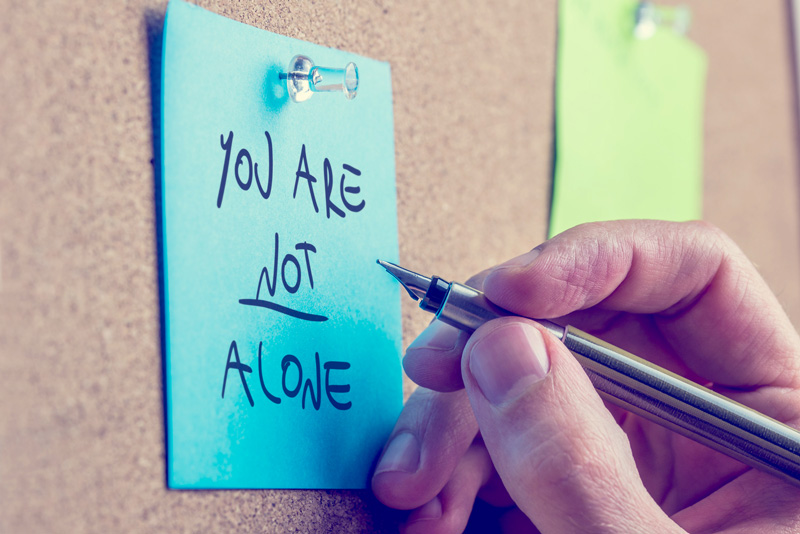For many with bipolar disorder, as well as other mental health conditions, stigma remains a real and regular burden in everyday life. In addition to the stressors and difficulties of the condition, the experience of stigma can lead to a host of deleterious outcomes including lower self-esteem, reduced quality of life, and worse physical and mental health (Au et al., 2019; Alonso et al., 2009; Livingston & Boyd, 2010).

Fortunately, stigma has made its way into the public eye in recent years with increased dedication to education and reduction. After all, people with bipolar disorder deserve the same rights, respect, and opportunities as everyone else. There should be no barriers simply due to false preconceived notions about what bipolar disorder is or how it manifests.
Self-stigma, in comparison, is often under-examined.
Self-stigma is what happens when people take the public’s negative, stigmatized beliefs about those with bipolar disorder (or another mental health condition) and turn them inwards. They internalize these false statements until the statements become core beliefs. It’s extremely common; in a survey conducted by Dubreucq et al. (2021), 1 in 3 people with bipolar disorder were found to experience high levels of self-stigma. If someone continuously hears that people with bipolar disorder are dangerous/unreliable/lazy, they will likely at some point begin to internalize these false beliefs. “I have bipolar disorder – I guess I am dangerous/unreliable/lazy, too. After all, I’m one of those people.”
Self-stigma may also occur when people take truths about their experiences with bipolar disorder and distort or exaggerate them beyond recognition. For example, Rosa et al. (2008) showed that occupational functioning is often impaired in bipolar disorder. An individual may have experienced times of intense symptoms during which they were less productive in the workplace. This experience may be distorted into a statement such as “I’m useless at work” or “I’m unemployable.” These self-stigmatizing thoughts are not true and it’s clear how they could be harmful to someone’s wellbeing.
There is a plethora of negative consequences of self-stigma in bipolar disorder. Jenhani et al. (2022) demonstrated that self-stigma frequently leads to feelings of lower self-esteem. Additionally, Özdamar Ünal et al. (2022) showed that self-stigma can lead to a worse experience of the condition with more depressive episodes while Perich et al. (2022) showed that self-stigma is correlated with poorer functioning. Bipolar disorder, with its unpredictable and often devastating outcomes, is hard enough to live with: self-stigma just adds insult to injury.
Given the mental health crisis in our world, self-stigma is one problem those with bipolar disorder shouldn’t have to add to their list of troubles. It is imperative that real, immediate, and targeted measures be taken to address the issue.
One solution to the problem is the new intervention Overcoming Self-Stigma in Bipolar Disorder (OSSiBD). OSSiBD is an eight-session small group program designed for individuals with bipolar disorder who are experiencing self-stigma, shame, and embarrassment due to their diagnosis. The program, which is fully manualized, can be run by any mental health professional. The materials, comprised of a Facilitator’s Manual and Participant’s Workbook, are intended for use in and are available for free to hospitals, clinics, inpatient/outpatient programs, and private practices.
The OSSiBD program employs a number of evidence-based techniques and activities to directly address self-stigma. It begins with psychoeducation on bipolar disorder including a resilience-based continuum model of wellness and recovery. Following that, techniques of Narrative Enhancement and Cognitive Therapy are employed. These ask participants to consider other parts of their identity aside from bipolar disorder as well as to celebrate their strengths. This is proceeded by information on the formation of stigma and self-stigma. The following two sessions teach Cognitive Behavioral Therapy tenets and skills that are then used to reframe self-stigmatizing thoughts. A discussion of disclosure tips and techniques comes next followed by an examination of the impact of relationships and culture on self-stigma. The program culminates in participants drafting brief strengths-based autobiographies that also utilize their new reframing skills and social insights. Since these activities are all presented in a graphically designed hard copy workbook, participants end the program with a meaningful journal-like keepsake of their growth.
The experience takes place in a small group of approximately 10 participants. This exposure to peers living through similar struggles is intentional and crucial: Maunder & White (2021) showed that peer contact may help reduce self-stigma in various mental health conditions.
The aforementioned settings of inpatient, outpatient, clinic, and private practice, which are often the cornerstone of treatment, provide the perfect opportunity to address self-stigma where it begins. However, those who have been living with bipolar disorder for some time may be even more seriously entrenched in the experience of self-stigma. Therefore, it is equally important that they have access to this opportunity to learn, grow, and heal. OSSiBD groups are ongoing and available for free to individuals through the Depression and Bipolar Support Alliance of California.
OSSiBD was developed as part of the doctoral dissertation of A.B. Vassilev (Vassilev, 2022) and was reviewed by a worldwide team of experts in the fields of bipolar disorder and stigma before publication. Its activities and theoretical foundations are rooted in evidence-based practices for the treatment of self-stigma in various conditions. It is the first comprehensive program to specifically focus on the self-stigma experience in bipolar disorder.
Given the treacherous nature of bipolar disorder, with its lifelong, often worsening, trajectory and serious impact on quality of life, the last thing patients need is to live in shame about a condition they didn’t choose to have. While interventions to reduce stigma in the general population may lead to an eventual reduction in self-stigma, the crisis of self-stigma in bipolar disorder warrants the attention of clinicians and hospitals across the nation and globe. Only through direct intervention and the cooperative support of patients can we help them reclaim their self-esteem and self-worth in the face of such a difficult condition.
Andrea B. Vassilev is a fifth-year doctoral student in clinical psychology, speaker, author, member of the advisory board of the Depression and Bipolar Support Alliance of California, and active member of the International Society of Bipolar Disorders. To contact Ms. Vassilev, please email andrea@ossibd.com. Please visit www.ossibd.com for full information.
References
Au, C. H., Wong, C. S. M., Law, C. W., Wong, M. C., & Chung, K. F. (2019). Self-stigma, stigma coping and functioning in remitted bipolar disorder. General Hospital Psychiatry, 57, 7-12. https://doi.org/10.1016/j.genhosppsych.2018.12.007
Alonso, J., Buron, A., Rojas-Farreras, S., de Graaf, R., Haro, J. M., de Girolamo, G., Bruffaerts, R., Kovess, V.,Matschinger, H., & Vilagut, G. (2009). Perceived stigma among individuals with common mental disorders. Journal of Affective Disorders, 118(1–3), 180–186. https://doi.org/10.1016/j.jad.2009.02.006
Dubreucq, J., Plasse, J., & Franck, N. (2021). Self-stigma in serious mental illness: A systematic review of frequency, correlates, and consequences. Schizophrenia Bulletin, 47(5), 1261-1287. https://doi.org/10.1093/schbul/sbaa181
Livingston, J. D., & Boyd, J. E. (2010). Correlates and consequences of internalized stigma for people living with mental illness: A systematic review and meta-analysis. Social Science & Medicine, 71(12), 2150–2161. https://doi.org/10.1016/j.socscimed.2010.09.030
Maunder, R. D., & White, F. A. (2021). The relationship between contact with peers and self-stigma in people with mental illness. Counseling Psychology Quarterly, 1-17. https://doi.org/10.1080/09515070.2021.1970514
Özdamar Ünal, G., Bektaş, Ö. N. A. L., İşcan, G., & İnci, A. T. A. Y. (2022). The Relationship between internalized stigma, perceived social support and self-efficacy in bipolar disorder. Genel Tıp Dergisi, 32(3), 350-357. https://doi.org/10.54005/geneltip.1104022
Perich, T., Mitchell, P. B., & Vilus, B. (2022). Stigma in bipolar disorder: A current review of the literature. Australian & New Zealand Journal of Psychiatry, 56(9). https://doi.org/10.1177/00048674221080708
Rosa, A. R., Franco, C., Martínez-Aran, A., Sánchez-Moreno, J., Reinares, M., Salamero, M., Arango, C., Ayuso-Mateos, J. L., Kapczinski, F., & Vieta, E. (2008). Functional impairment in patients with remitted bipolar disorder. Psychotherapy and Psychosomatics, 77(6), 390-392. https://doi.org/10.1159/000151520
Vassilev, A. B. (2022) Overcoming self-stigma in bipolar disorder: an intervention. [Doctoral dissertation, Alliant International University].







